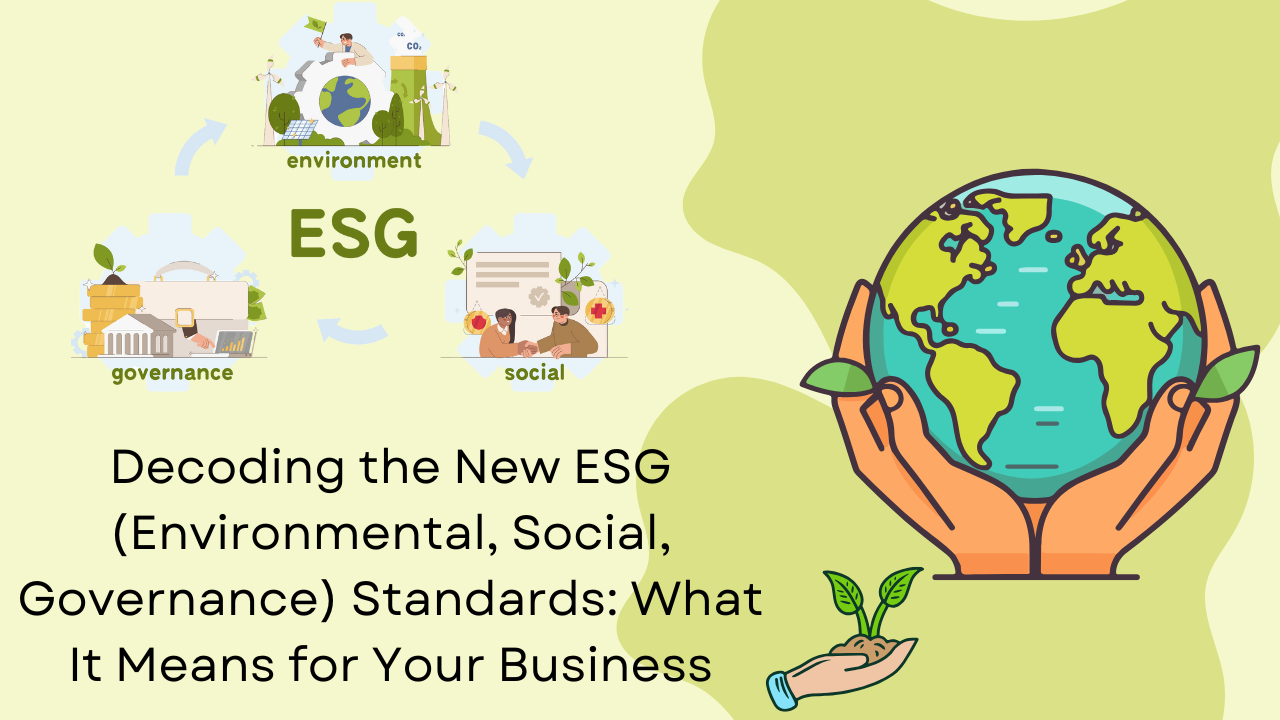In today’s rapidly evolving corporate landscape, Environmental, Social, and Governance (ESG) standards have become essential for responsible business practices. As new ESG regulations and frameworks gain traction worldwide, businesses must navigate these changes strategically to stay competitive and credible. Let’s delve into the latest developments in ESG standards and explore their implications for your business.
What is ESG?
ESG is a framework that enables stakeholders to assess how an organization manages risks and opportunities related to environmental, social, and governance factors. It reflects a holistic view of sustainability, encompassing much more than environmental issues.
Breaking Down ESG
1. Environmental
This pillar focuses on an organization’s environmental impact and risk management. Key factors include:
- Climate resilience (e.g., managing risks from flooding and wildfires).
- Stewardship of natural resources.
- Direct and indirect greenhouse gas emissions.
2. Social
The social component examines how organizations interact with stakeholders. Key considerations include:
- Human capital management (e.g., equitable pay, employee engagement).
- Community impact and supplier chain practices, especially in regions with weaker labor or environmental standards.
3. Governance
Governance focuses on corporate management and leadership alignment with stakeholder expectations. Analysts evaluate:
- Shareholder rights and leadership incentives.
- Transparency, accountability, and internal control mechanisms.
ESG Trends in India
1. Regulatory Push
The Securities and Exchange Board of India (SEBI) has introduced measures like:
- SEBI brought BRSR with quantitative disclosures on ESG. We are helping companies in adapting to these regulatory changes, working closely with Mantraa‘s sustainable business practices expertise that brings alignment to global ESG standards.
- Mandatory assurance for ESG disclosures to ensure accuracy and transparency.
2. Global Investor Expectations
India’s position as a global investment hub attracts ESG-conscious investors, including private equity firms and sovereign wealth funds.
3. Sustainability as a Business Opportunity
Sectors like renewable energy, electric vehicles, and green hydrogen are lucrative markets driven by government incentives and consumer demand.
4. Stakeholder Pressure
Millennials, Gen Z consumers, and employees increasingly demand purpose-driven brands and workplaces.
Why Indian Businesses Should Prioritize ESG
1. Competitive Advantage
Early embracing of the ESG practices makes the companies market leaders at the top. It enhances the attractiveness of the companies toward investors because they are regarded responsible business operations that result in long-run value creation in business & company valuation services. Notable examples include Tata Group and Infosys.
2. Access to Capital
Financial institutions are tying credit terms to ESG performance, and green bonds are becoming a popular financing tool.
3. Risk Mitigation
Compliance minimizes regulatory penalties and reputational risks, helping businesses future-proof operations.
4. Supporting National Goals
By aligning with India’s SDG commitments and climate summit objectives, businesses contribute to both national and global sustainability efforts.
How to Adapt to ESG Standards
- Understand the Frameworks: Familiarize yourself with guidelines like BRSR, GRI, or SASB to align reporting with global standards.
- Conduct an ESG Gap Analysis: Identify areas for improvement, focusing on energy, waste management, governance, and community engagement.
- Leverage Technology: Use AI-driven ESG tools for data collection, analysis, and reporting.
- Engage Stakeholders: Collaborate with employees, investors, and suppliers to co-create effective strategies.
- Monitor and Report Progress: Set measurable goals and maintain transparency to build trust.
Conclusion
ESG for Indian businesses is compliance beyond itself—a road to the way to ultimate success. Better ESG performance reduces several risk factors while providing companies with even more attractive deals in M&A transaction advisory services as well as improved business valuation services within India.

